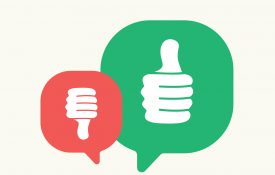-

Even When Test Scores Go Up, Some Cognitive Abilities Don’t
Schools whose students have the highest gains on standardized test scores do not produce similar gains in tests that measure abstract and logical thinking, a data analysis shows.
-
It’s Not That Easy Being Mean
An impatient commuter shoves us out of the way to get onto the subway train. The bullying boss enjoys berating us in front of colleagues. We routinely deal with people who seem socially reckless, quick to retaliate at any perceived slight, and unremorseful if not downright sadistic. And some of us ourselves can spew misery on our colleagues, friends, and family members. In truth, though, the modern mantra “mean people suck” fails to capture many underlying drivers of aggression, cruelty, and hostility — traits that often fire up rampant conflict in the workplace.
-
Tiny Foragers: How Do We Know What’s Safe To Eat?
It’s the holiday season, and we’ll soon be decorating our home with greenery—holly sprigs, poinsettia, maybe a mistletoe, and of course the tree, probably some kind of spruce. We’ll have young kids around, and most of this greenery is benign. But some of these plants are toxic, possibly even deadly, if eaten. So what we are doing in effect is creating a treacherous world for our youngest revelers to explore. Re-creating really. Our holiday home will be a microcosm of the ancient world in which our early ancestors lived, and died. Throughout evolutionary history, humans have gathered leaves and berries to eat, but they have done this with little information to guide their choices.
-

Money May Corrupt, but Thinking About Time Can Strengthen Morality
Experimenters have found that implicitly activating the concept of time seems to reduce cheating behavior by encouraging people to engage in self-reflection.
-
Think Again: Nostalgia Increases Positive Feelings Towards Out-Groups
Have you ever caught yourself wistfully thinking about a past event? If so, you aren’t alone; research has shown that almost everyone engages in nostalgic thinking and that these types of memories occur quite often — around 3 times per week. Historically, nostalgia was thought to be a variant of depression, but new research is changing the way we view this emotion. There is now a large body of evidence suggesting nostalgia has positive impacts on how people feel about themselves and how connected they feel towards others.
-
Understanding Cognition Through Mathematical Models
In order to improve our understanding of the human mind it is essential to collect data by measuring brain and behavior. Proper interpretation of such data, however, requires coherent data analysis and the development of formal process models. Eric-Jan Wagenmakers advocates Bayesian analysis tools and instantiates cognitive mechanisms in specific mathematical models. Such models stimulate the development of new theory and allow a more effective interaction between psychology and neuroscience.

